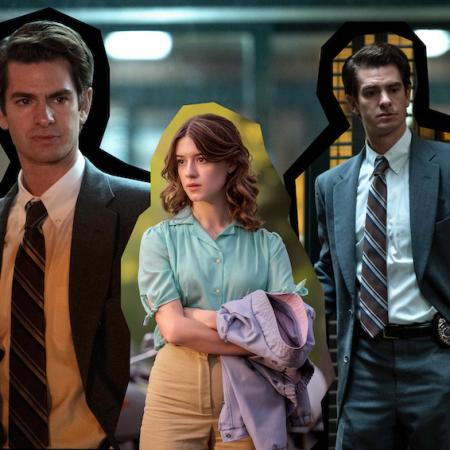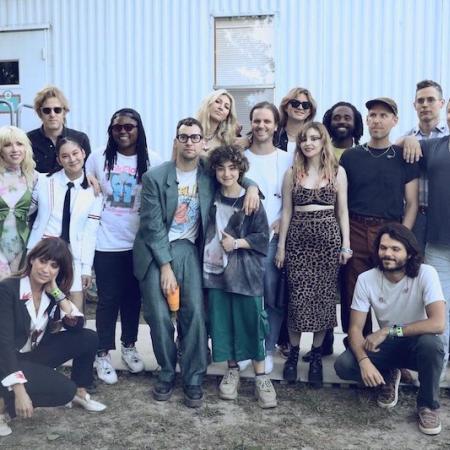Thomas-Brodie Sangster has embodied all that is Malcolm McLaren for his new Disney+ show, 'Pistol' - created by Craig Pearce, which explores the creation story and the following three years of the the Sex Pistols primarily through the lens of guitarist, Steve Jones.
From being catapulted into the world of acting and fame himself back in 2001, Brodie-Sangster is now the catapulter as he portrays McLaren who managed the Sex Pistols from their dawn 'til dusk. Determined to always find a piece of himself in the characters he portrays, Brodie-Sangster does hope that he's not too much like McLaren (who has been famously called "the most evil man in the world"): "I mean, he was hilarious and he was fantastic. A bit of a sleaze, but he was great, and he was very good at what he did, so I do quite admire his tenacity, his gumption, and his go-for-it attitude."
As part of being on the show, the actors had to learn to play their own instruments. Brodie-Sangster fondly reminisces on when he got to hear the band both singing and performing live: "You're at the 100 Club, and you were surrounded by some of the most amazing extras that just completely went for it and gave everything in every take, it felt like you were right there. This was happening in the middle of Covid and we were out having a rave, it really took you back to what it must have been like, and it really happened there in that venue, and there were pictures of the Sex Pistols up on walls."
As he walked through the streets of Soho, London, we recently chatted to Brodie-Sangster about all things technology, getting shivers from music, and who he'd want to play him in a biopic...
P.S. Thomas-Brodie Sangster has also contributed to guest-curating our latest Reflection zine - which you can order here.

COUP DE MAIN: When Malcolm first meets Steve, he asks him who his influences are. What do you personally think would be important things for a manager to want to know about a prospective client? What would you ask?
THOMAS BRODIE-SANGSTER: I think he's just trying to suss out who the guy is, what kind of sound he is after, what his background is - socially - and where his mind thinks. Especially if you're in the music world, asking who someone's influences are, it just kind of helps place them for you. I completely get why he asks who his influences are; he just does it in a slightly scathing way. The reply is the make or break situation for him. If he says the wrong person, I think it could dissuade Malcolm quite quickly.
CDM: The concept of masculinity is so interestingly unimportant to the Sex Pistols and we see that through their inspirations, counter-culture mindset, and style in general. When you let go of more traditional boxes, do you think you can more freely make art?
THOMAS: I don't know, I think anything that constricts you is an interesting place to be. It's not necessarily a bad thing because sometimes having guidelines and some kind of restriction in place, gives you a framework in order to be creative. However, having said that, to be able to just get rid of all of that and go in any direction you want has led the way for many artists. I think both both sides of the argument can work.
CDM: The cultural revolution has changed a lot since when the show was set. Back then, punk culture was cool, and now people grow up wanting to become influencers and its their dream to sell out - literally. Do you think the shift in what 'changing the world' means, changes with the people? Or more with the technology available?
THOMAS: I think for the current situation, it's very driven by the technology available. I think technology is able to develop at a rate that the human psyche, and just physically, the human being can't even dream to keep up with. We're being overtaken by technology at an alarming rate and we're kind of playing catch-up. We find ourselves at a time where we're trying to find out how we communicate with one another - it has changed drastically. The speed at which we can do so has changed, even this interview happening right now, for example, it's kind of mad. I'm stood on a street in Soho talking to you, and you're in New Zealand somewhere. That's just part and parcel of how life operates at the moment, and this in itself is a wonderful thing. If you let technology go unchecked, its effects on a young society coming up to sort of replace the previous generations... it's potentially quite a scary situation to be in. It's certainly something to have some kind of control over and mediate.

CDM: Do you have a favourite memory from the set of 'Pistol'?
THOMAS: I have lots of memories. My favourite memory is probably whenever I got to see the band play, it always gave me shivers. When we were at the 100 Club and we were just watching the boys go at it and do it, there was no soundtrack to play along to, one of the guys in the background just clicked in his head and he would just mime out the timing for Jacob the drummer, and then they would just go and they would play the songs and sing it for real. Everything you heard was what they were playing and they were amazing. You're at the 100 Club, and you were surrounded by some of the most amazing extras that just completely went for it and gave everything in every take, it felt like you were right there. This was happening in the middle of Covid and we were out having a rave, it really took you back to what it must have been like, and it really happened there in that venue, and there were pictures of the Sex Pistols up on walls. We were there for three days and I got shivers all three of those days.
CDM: If one day there is a biopic about you, who would you want to play you?
THOMAS: Anson Boon.
CDM: Is there a time period from your life that you'd want reflected in that biopic?
THOMAS: This one, this current time.
CDM: How much of yourself do you find reflected in Malcolm?
THOMAS: I always have to have some amount of myself in character. I hope it's not too much. I mean, he was hilarious and he was fantastic. A bit of a sleaze, but he was great, and he was very good at what he did, so I do quite admire his tenacity, his gumption, and his go-for-it attitude. He would really strive for these mad, mad ideas that nobody else would have bothered to go for because it was just too out there and not going to lead itself to success, let alone make any money. The Sex Pistols were just one of the rare exceptions that worked, but he had loads of mad ideas and I hugely admire that, it's something I should probably work on doing more - following a mad idea and pushing it as far as it'll go and having faith in myself.

CDM: What type of research and preparation did you do to get into the character and learn more about Malcolm?
THOMAS: Watching lots of videos! He has very strange mannerisms, his physicality is quite specific, and the timbre of his voice is quite specific. It changes quite a lot depending on who he's talking to. Lots of archive footage, lots of interviews, and then just sitting in the room with Danny and all the other guys and just sitting and feeling it really until it felt like it was natural to me.
CDM: In episode two, Malcolm is quite energetically giving the band direction. Do you think the role of a manager should be more like Yoda with a gentle guiding leadership, or actively helping to shape the artist creatively?
THOMAS: I'm not in the music industry so it's hard for me to comment really, but I would imagine that it all depends on the people involved and how they react to any kind of action. I would imagine that those boys are actually quite a hard group to keep in line, or to have any control over at all, so perhaps you needed a stronger hand. I think it really depends on the people involved.
'Pistol' is out now on Disney+...











